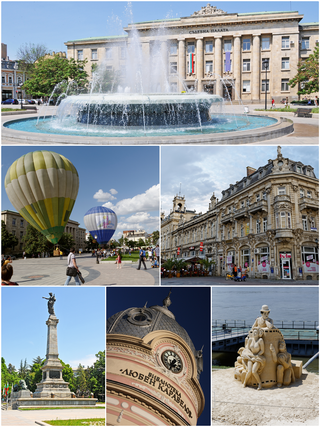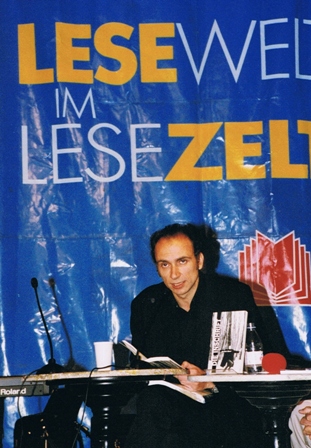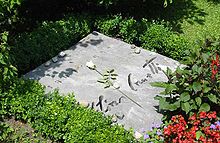
Imre Kertész was a Hungarian author and recipient of the 2002 Nobel Prize in Literature, "for writing that upholds the fragile experience of the individual against the barbaric arbitrariness of history". He was the first Hungarian to win the Nobel in Literature. His works deal with themes of the Holocaust, dictatorship, and personal freedom.

Ruse is the fifth largest city in Bulgaria. Ruse is in the northeastern part of the country, on the right bank of the Danube, opposite the Romanian city of Giurgiu, approximately 67 km (42 mi) south of Bucharest, Romania's capital, 172 km (107 mi) from Varna, and 249 km (155 mi) from the capital Sofia. Thanks to its location and its railway and road bridge over the Danube, it is the most significant Bulgarian river port, serving an important part of the international trade of the country. It is the 12th largest of all cities on the Danube river.

Elfriede Jelinek is an Austrian playwright and novelist. She is one of the most decorated authors to write in German and was awarded the 2004 Nobel Prize in Literature for her "musical flow of voices and counter-voices in novels and plays that, with extraordinary linguistic zeal, reveal the absurdity of society's clichés and their subjugating power". She is considered to be among the most important living playwrights of the German language.

Robert Menasse is an Austrian writer.
Austrian literature is mostly written in German, and is closely connected with German literature.

The Georg Büchner Prize is the most important literary prize for German language literature. The award is named after dramatist and writer Georg Büchner, author of Woyzeck and Leonce and Lena. The Georg Büchner Prize is awarded annually for authors "writing in the German language who have notably emerged through their oeuvre as essential contributors to the shaping of contemporary German cultural life".
Jeremy Adler is a British scholar and poet, and emeritus professor and senior research fellow at King's College London. As a poet he is known especially for his concrete poetry and artist's books. As an academic he is known for his work on German literature specialising in the Age of Goethe, Romanticism, Expressionism and Modernism with contributions on figures such as Goethe, Hölderlin, and Kafka.

Christoph Ransmayr is an Austrian writer.

Germans are a minority ethnic group in Bulgaria. Although according to the 2001 census they numbered 436, the settlement of Germans in Bulgaria has a long and eventful history and comprises several waves, the earliest in the Middle Ages.

Peter von Matt is a Swiss philologist and author.

Nessim Jacques Canetti was a French music executive and a talent agent. Born into a Sephardic Jewish family, his parents were Jacques Elias (Elieser) and Mathilde (Mazal) Canetti. He was the brother of the Nobel Prize-winning author Elias Canetti (1905–1994) and of Georges Canetti (1911–1971), a researcher and professor at the Pasteur Institute. Canetti studied at the École des Hautes Études Commerciales.

Dimitré Dinev is a Bulgarian-born Austrian writer. He is best known for his play Kozha i nebe, which controversially won the Askeer prize in 2007.

Josef Haslinger is an Austrian writer.

Ventseslav Konstantinov was a Bulgarian writer, aphorist and translator of German and English literature.
Milan Richter is a Slovak writer, playwright, translator, publisher and a former high-ranking diplomat.
Marianne Fritz was an Austrian writer and novelist. She is known for her multi-volume series of novels dealing with the history of Austria in the twentieth century. Her work is noted for its experimental nature and extraordinary length.
Venetiana "Veza" Taubner-Calderon Canetti was an Austrian novelist, playwright, and short story writer. Her works – including singular short stories published in the Viennese Arbeiter Zeitung and other socialist outlets – were only published under her own name posthumously. She preferred pseudonyms, as was common at the time for left-wing or satirical authors, her favourite being Veza Magd. The Tortoises which is set at the time of the Kristallnacht in 1938 remains her only known published novel. Her husband and Nobel Prize in Literature laureate Elias Canetti further posthumously declared her to be co-author of his Crowds and Power. She was also a translator of Wolf Solent by John Cowper Powys, though the named translator is Richard Hoffmann who owned the agency where she freelanced, and three books by Upton Sinclair for the Malik Verlag (1930-32), where the named translator is once again male, this time her partner and future husband, Elias Canetti.

Anna Kim is an Austrian writer.

The 1981 Nobel Prize in Literature was awarded to the Bulgarian-born British writer Elias Canetti (1905–1994) "for writings marked by a broad outlook, a wealth of ideas and artistic power." Though living in Great Britain since 1938 and became a British citizen in 1952, he wrote primarily in the German language. He is the first native of Bulgaria to win the prize.


















